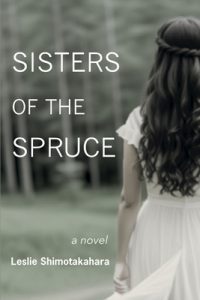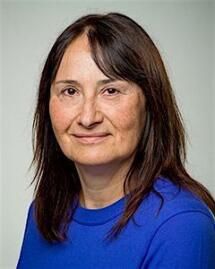Coming of age, grimly
Sisters of the Spruce
by Leslie Shimotakahara
Qualicum Beach: Caitlin Press, 2024
$26.00 / 9781773861371
Reviewed by Candace Fertile
*

Leslie Shimotakahara’s third novel, Sisters of the Spruce, takes readers to the Queen Charlotte Islands (now Haida Gwaii) during WW1. The main character, Khya Terada, is also the narrator, and at fourteen years of age she has far too many problems to cope with, including racism and sexism. Her father Sam (Sannosuke) works in logging camps at what appears to be precarious and poorly paid work, but does what he can to support his wife and children, son Masao (a logger), and daughter, Izzy (Izumi), Khya and May. Khya was named for the Khyex River, a tributary of the Skeena. The anglicization of Japanese names indicates the family’s attempt to fit into Canadian culture.
The Terada family has been split for some time. Sixteen-year-old Izzy was mostly raised in Japan, and when she comes to British Columbia to be reunited with her parents, life is more difficult for her than for the others as she is not used to English. Khya doesn’t speak Japanese as she has lived in Canada all her life. Izzy is also not used to the rough life the family has to endure. So the family has fractures that need mending.
The problems are clear from the beginning. The Teradas relocate from Prince Rupert to Haida Gwaii and are given a decrepit cottage to live in. One of the first people Khya meets is Irene, who suggests Khya could work where she does—in a brothel. Khya is insulted on two levels: “Who did she think she was talking to? It was bad enough that she’d pegged me as a girl, but did I look like that kind of girl?” Khya’s boyish haircut and demeanor help protect her from unwanted advances, but her preferred appearance also hints at her sexual orientation.

The three sisters are close, and Khya is the glue, striving to set a good example for little May and then going to great lengths to try to help a pregnant Izzy after her boyfriend abandons her. The choices for all the characters are limited, in most cases because of poverty, but women are particularly trapped. They can be wives and mothers if their partner is responsible and can support them, they can be servants at very low wages, and they can be sex workers. It’s all quite grim.
Shimotakahara (Red Oblivion) delves into the sex work aspect of the novel in some detail. As happens around the world, women (and girls) turn to prostitution out of necessity. Most of the male figures in this novel are ruthless unlikeable cartoons, some even drugging girls to sell them into the sex trade. Violence is a daily occurrence. Khya, a curious mixture of innocence and experience, starts out with good intentions, but adapts to criminal behaviour quite quickly when necessary. You can’t blame her, but much of the action in the novel seems designed to show plucky Khya is in the face of a crisis, and as the novel progresses, more and more problems are thrown at her. She tends to react with wisdom and bravery beyond her age. Overall, the characters are ciphers for the social problems the author illuminates.
Logging is clearly a dangerous job, and life in the small communities and camps, as Leslie Shimotakahara describes, is one that most people want to escape. These characters scratch out a living however they can, and their hope for a different future is seldom realized. Fortunately, Khya is relentless in her quest for a better life for her sisters and herself. And that dogged pursuit is the most appealing aspect of this novel even if it doesn’t seem realistic.

*

Candace Fertile has a PhD in English literature from the University of Alberta. She teaches English at Camosun College in Victoria, writes book reviews for several Canadian publications, and is on the editorial board of Room Magazine. [Editor’s note: Candace has reviewed books by Hannah Calder, M.V. Feehan, S.C. Lalli, Rebecca Godfrey with Leslie Jamison, Ian and Will Ferguson, Shashi Bhat, Carleigh Baker, Kathryn Mockler, Lucia Frangione, Darcy Friesen Hossack, Robin Yeatman, Emi Sasagawa, Patti Flather, Peter Chapman, Janie Chang, Pauline Holdstock, Ava Bellows, Beth Kope, Geoff Inverarity, and Angélique Lalonde for BCR.]
*
The British Columbia Review
Interim Editors, 2023-26: Trevor Marc Hughes (non-fiction), Brett Josef Grubisic (fiction and poetry)
Publisher: Richard Mackie
Formerly The Ormsby Review, The British Columbia Review is an online book review and journal service for BC writers and readers. The Advisory Board now consists of Jean Barman, Wade Davis, Robin Fisher, Barry Gough, Hugh Johnston, Kathy Mezei, Patricia Roy, and Graeme Wynn. Provincial Government Patron (since September 2018): Creative BC. Honorary Patron: Yosef Wosk. Scholarly Patron: SFU Graduate Liberal Studies. The British Columbia Review was founded in 2016 by Richard Mackie and Alan Twigg.
“Only connect.” – E.M. Forster